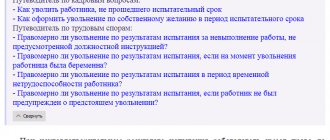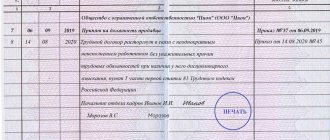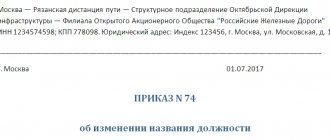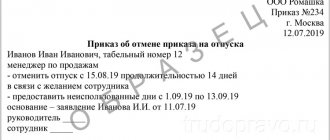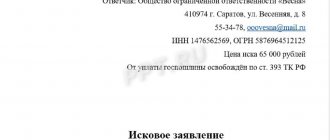11.07.2019
447
4 min.
Relations between employees and employers are regulated by the Labor Code of the Russian Federation. There are several grounds for terminating a contract with ordinary personnel, but there are certain specifics for dismissing persons in management positions. Only the owners of the enterprise or citizens authorized by them can initiate the termination of relations. The whole cycle is described in paragraph 2 of Art. 278 Labor Code.
The procedure for dismissing a manager
A manager is a person vested with executive responsibilities for managing an enterprise or any of its departments. Reasons for dismissing such an employee include:
- The list specified in Article 77 of the Labor Code of the Russian Federation - mutual consent, expiration of the contract without extension, and so on.
- An employer’s decision related to the presence of violations of clauses of the employment agreement, for example, failure to fulfill duties.
- In court in connection with bankruptcy or the initiative of the founder.
The dismissal of a manager, like any ordinary employee, may be related to business needs. In particular, the owner of the company decides to change the strategy or management structure. He, as an independent entrepreneur, has the right to do this, even without serious grounds for dismissal. Article 278 of the Labor Code of the Russian Federation describes the rights of the employer in more detail.
Along with this, if discrimination is traced in the actions of the owner, then the dismissed employee has the right to appeal this decision. On the one hand, the owner has the opportunity to act as he sees fit without explaining the reasons, on the other hand, some wording when terminating the contract will cause a lot of trouble.
Labor Code of the Russian Federation Article 278
An employment agreement with the director of an enterprise can be terminated on the following grounds:
- change of company owner;
- change in the organizational and legal form of the enterprise;
- the manager caused damage to the company’s property;
- A gross violation of labor duties was recorded.
Article 278 of the Labor Code of the Russian Federation presents not only the procedure and grounds for terminating an employment contract with a manager, but also a list of persons who have the right to this action. In accordance with the law, these include:
- A body of a legal entity, which, depending on the form of the enterprise, can be a meeting of shareholders or a board of directors.
- The owners of the company's property are the founders.
- Participants of a joint stock company acting through representatives under a notarized power of attorney.
Attention! The owners of the property of unitary enterprises are the authorities of the Russian Federation at all levels. The procedure for dismissing heads of government agencies is described in Federal Law 161.
When terminating an employment contract with senior management, it is important to focus not only on federal legislation, but also on internal regulations. If the procedure does not comply with the rules adopted by the company, the court will declare the decision illegal. But local documents cannot contradict Art. 278 Labor Code.
Legal aspects
The dismissal procedure is regulated by the Labor Code. As noted above, the business owner has the right to terminate the contract unilaterally if he considers it necessary in accordance with Article 278 of the Labor Code. But the dismissed manager retains the right to go to court. Thus, an employer may be accused of illegality of action if:
- the decision is contrary to the interests of the company;
- there are violations in the dismissal procedure;
- discrimination on any grounds is grounds for termination of the contract.
Attention! Of course, each of these aspects must be proven in court, as stated in Article 278 of the Labor Code. And in response to the claim, the employer can accuse the manager of irrational management, waste of funds, and so on.
Judicial practice in such cases is ambiguous, since everything depends on the specific circumstances of the case. Please note that reinstatement is rare, but it is acceptable if the entire team supports the manager’s position. However, even if the employees are loyal, if there is evidence of the boss’s mistakes, the court will not side with the victim, and may also oblige him to compensate for material damage.
What can you do if you were fired without reason?
Although dismissal without explanation is possible for senior company officials, such actions are strictly prohibited for ordinary employees. In practice, the employer often exerts moral pressure on the employee, forcing him to resign without any good reason.
Situations are possible when an employee refuses to write a statement of his own free will based on the results of such influence. Then the employer can artificially create various conflict situations for the purpose of formally imposing disciplinary sanctions and subsequent dismissal of the “undesirable” employee on the initiative of the administration.
If an injured citizen believes that his rights were violated and he was fired illegally, or with the use of moral and psychological pressure, without specifying objective reasons, he has the right to defend his rights. For these purposes, the following tools are available to him:
- Write a written appeal to the owners of the company, complaining about the illegal actions of the executive body;
- Apply to the trade union body (if there is one) with a statement to protect your legal rights;
- Submit a written complaint to the State Tax Inspectorate;
- Report a violation of your rights to the prosecutor's office;
- File a claim in court to have the dismissal declared illegal and reinstated at work.
The first option, as a rule, is ineffective, since in most cases the owners trust the decisions of the executive body authorized by them. Trade unions also do not operate in all organizations. Therefore, the most effective from a practical point of view will be appeals to the labor inspectorate, prosecutor's office or court.
How to write a complaint about illegal dismissal to the labor inspectorate?
An employee has the right to complain about illegal actions of the company administration to the labor inspectorate. To do this, he draws up a written request in free form, in which he indicates:
- Name of the institution where you are applying;
- Applicant's contact details;
- The essence of your appeal, violations committed by the employer, evidence of his illegal actions.
The appeal can be delivered in person or sent by mail with a list of attachments. Having received the application, the inspector initiates an inspection of the employer. Within 10 days from the date of the application, the inspection must provide a response based on the results of the inspection. If violations are discovered during dismissal, the inspectorate has the right to file a claim in court to protect the rights of the employee. It is better to contact the State Tax Inspectorate if you have irrefutable evidence of violations on the part of the employer. If formal evidence of the employer’s guilt is not found, the inspectors will also have no grounds for filing a claim.
Stages of termination of employment relationship
Let's consider the sequence of steps when terminating a business relationship with a manager in accordance with paragraph 2 of Article 278 of the Labor Code:
- Making a decision to dismiss a person holding a management position by a circle of authorized persons.
- Issuance of an order, which is formed by the responsible body a few days before the employee leaves.
- Preparation of a package of documents for the unified state register of legal entities regarding changes.
- Transfer of cases and documents to the new manager.
- Entering information about dismissal into the employee’s personal file and work book.
- Carrying out financial calculations by the accounting department - salary for the last period, unused vacation and compensation.
- Acceptance of a new director and notification of counterparties, in particular the tax service, bank and others.
If the cycle is violated, the company not only faces difficulties with paperwork, but also administrative sanctions in the form of monetary fines. Please note that dismissal without explanation is permissible under Article 278.
Dismissal without explanation
The labor legislation of the Russian Federation provides that an employment contract concluded between an employee and an employer can be terminated:
- in connection with the expiration date of its validity or the condition of performing certain works;
- earlier than the designated period of validity by agreement of the parties or at the request of one of the parties with justification of the reasons;
- open-ended contracts can also be terminated at any time and the employee dismissed: at the request of the worker himself, if he writes a corresponding statement;
- the initiator can be the head of the enterprise if he is not satisfied with the employee’s work;
Any termination of employment must comply with all statutory requirements.
Otherwise, the dismissed employee may appeal to the labor inspectorate or the prosecutor's office with a complaint, or to the court with claims.
After checking the specified facts about non-compliance with labor legislation upon dismissal, recognizing the claims as legitimate and justified, the employee can be reinstated at work with the recovery from the enterprise in his favor of average earnings for all days of forced absence - from the date of dismissal until reinstatement in his previous position .
In addition, an employee dismissed with violations of the Labor Code of the Russian Federation has the right to demand compensation for moral damage caused to him undeservedly.
If there are proven facts of violation of labor legislation, management may be subject to an administrative fine in the amount of one to five thousand rubles; in addition, an enterprise, as a legal entity, may be fined in a larger amount - from thirty to fifty thousand.
Responsible persons who formalize the dismissal of an employee are required to very carefully prepare all documentation and not violate all the necessary procedural steps, depending on the reason for the dismissal.
Grounds for dismissal
1. When dismissing at your own request, there must be a statement from the employee who wants to terminate the employment relationship.
According to the norms of the Labor Code of the Russian Federation, it is not necessary to indicate the reason why an employee wants to quit.
In Art. 80 of the Labor Code of the Russian Federation stipulates that the application must be submitted to the employer at least two weeks in advance if there are no significant reasons why the employee cannot continue to perform his job duties.
Moreover, in case of dismissal of the head of the enterprise at his own request, he is obliged to notify the authorized higher body one month in advance of his intention to terminate the employment contract.
During the period that the resigning employee must work before the dismissal order is issued, he has every right to change his decision up to the last day of the term (two weeks or a month, depending on whether a simple employee or the head of the enterprise is resigning) and withdraw his application for dismissal.
2. Article 81 of the Labor Code of the Russian Federation provides a list of grounds for dismissal at the initiative of the employer.
3. For the head of an enterprise, the requirements in everything are much higher than for ordinary employees, and the Labor Code is no exception in this matter.
Article 278 of the Labor Code of the Russian Federation provides additional grounds for dismissal of the head of an organization or enterprise.
Can a manager fire without giving a reason?
Article 81 of the Labor Code of the Russian Federation specifically indicates the grounds on which the head of an enterprise (organization) can dismiss an employee.
1. In the event of liquidation of the enterprise itself or if an individual entrepreneur ceases his activities.
This article provides that in the event of liquidation of one organization by reorganizing it into another, employees should be offered to transfer to a new company (organization) created on the basis of the one being liquidated, and only if they refuse, dismissal is possible.
Or, when an enterprise is completely liquidated, it goes without saying that the dismissal of all employees is inevitable.
2. If it is necessary to reduce the workforce, employees are warned in writing in accordance with the established procedure about the upcoming reduction and, if there are vacant positions, they are offered further employment.
Reducing the number of employees does not imply transfer to vacant positions, since transfers within the enterprise will not reduce the number of employees.
3. In cases where, based on the conclusion of the certification commission, a decision was made that the employee’s qualifications do not correspond to the position held, after the fact that the employee does not want to improve the level of his knowledge, he may be dismissed for incompatibility with the position held.
4. If the owner of the property of an enterprise changes, he has the right to change its management team - the first manager, his deputy and the chief accountant.
The rest of the employees cannot be fired just like that.
5. For gross violation of their official duties, both the head of the enterprise and an ordinary employee can be dismissed.
The following are considered gross violations:
- being at work in an inadequate state (alcohol or drug intoxication);
- absenteeism, both absence from work all day and for four hours;
- if an employee who, due to his job duties, knows secret information relating to production or the state, is caught distributing it;
- theft of the enterprise's property or its destruction, established by an authorized body or a court decision, or misappropriation of funds;
- violation of labor protection requirements, which may result in injuries and injuries to workers, including fatalities;
6. If a financially responsible employee (including the head of the enterprise) loses confidence as a result of guilty actions. For example, concealing true information about the income and expenses of an enterprise.
7. If the management of the enterprise makes decisions that entail significant harm to its development and future activities.
8. An employee involved in raising children and youth commits actions that are incompatible with moral standards.
9. The manager grossly violates his duties stipulated in the employment contract and job description.
10. Providing false documents when applying for a job.
11. There are also other grounds for dismissal, which can be defined in the local documents of the organization or established by Federal laws.
Dismissal without explanation, Article 278 of the Labor Code of the Russian Federation applies only in addition to the grounds on which the head of an enterprise can be dismissed.
In relation to other employees upon dismissal, the provisions of this article cannot be applied.
The manager cannot dismiss an employee without specifying specific reasons, both in the dismissal order and when making an entry in the work book.
The procedure for dismissing a manager without explanation
According to paragraph 2 of Art. 278 of the Labor Code of the Russian Federation, the head of an enterprise can be dismissed without explanation by decision of the authorized body or the owner of the enterprise’s property.
At the same time, the dismissal of a manager without explanation must be in compliance with all procedural norms.
1. The body that hired him in this position has the right to terminate the employment contract with the manager ahead of schedule without any explanation.
Before terminating an employment contract with a manager, there must be a decision of the meeting of shareholders or the owner, formalized accordingly depending on the form of ownership of the enterprise.
If it is a Joint Stock Company or a Limited Liability Company, there must be a meeting of shareholders or the board of directors, if this is provided for by the company's charter.
In a municipal institution or state enterprise, the owner of the property has the right to make the decision.
2. It is important to comply with the procedure for organizing and holding the meeting itself.
All shareholders and the head of the organization must be notified in writing about the day, time, place and agenda.
The decision made to dismiss a manager must be recorded, indicating the number of those present and, accordingly, those who voted for and against the dismissal.
Here a decision must be made to appoint a new manager and a person responsible for receiving and transmitting documents from the previous manager.
A copy of the minutes of the meeting must be given to all founders.
3. On the last working day, an order is issued to remove the authority of the manager (the case when the manager can write an order for himself).
4. According to the act of acceptance and transfer of affairs, the dismissed manager must transfer all documents and material assets in his charge to his newly appointed successor or the person appointed responsible for receiving documentation.
5. On the last working day, a full payment is made and a work book is issued with the corresponding entry without specifying the reason with reference to Art. 278 Labor Code of the Russian Federation.
It is important to consider that if a manager is dismissed without explanation, he must receive benefits in the amount of at least three salaries and other payments provided for by local documents.
6. First of all, the bank in which the organization’s account is opened must be notified about the change of management.
7. In the next three days, the new manager must submit information to make changes to the Unified Register of Legal Entities and submit information to the bank to change the bank card.
Source: https://Vse-o-Trude.ru/uvolnenie-bez-obyasneniya-prichin/
Compensation for the manager upon dismissal
The procedure for dismissing a manager has a number of important differences. Firstly, if we are talking about termination of the contract by decision of the judicial authorities, then the person is deprived of a number of social guarantees, in particular, the offer of another place of service, payment of a two-week salary.
Secondly, there are special privileges:
- provision of compensation, the amount of which is not less than three months’ salary;
- prohibition on dismissal during vacation or temporary disability.
It is important to know! Even if the employment contract does not indicate the obligation to pay compensation, the employer must provide it. The amount is calculated based on the average daily income of a citizen, taking into account bonuses and other remunerations. The period for analysis is the last twelve months.
Additional cash benefits are not paid if the dismissal is due to the bankruptcy of the enterprise, the expiration of the contract, or the initiative of the employee himself. But if the owner of the company’s property changes, then the transfer of compensation is necessary.
Guarantees and recommendations
Guarantees for the head of a department, division or organization are prescribed in Article 279 of the Labor Code of the Russian Federation, and their main essence is not only to prevent arbitrariness and discrimination of a manager upon dismissal, but also to protect him from possible negative consequences that may occur after settlement in connection with with loss of basic income. In general, we are talking about the following guarantees for the resigning employee:
- Cash compensation commensurate with average earnings for the last 6-12 months of service (the exact amount or an individual formula for calculating it can be specified in the TD);
- The decision to dismiss rests with the owner or his trustee/manager, as well as the relevant bodies of the legal entity;
- Involvement in material/criminal liability becomes possible only if there is evidence of the manager committing unlawful actions or his criminal inaction;
- The amount of monetary compensation not specified in the TD is determined by Article 279 of the Labor Code of Russia.
In turn, the legislative bodies have developed a list of recommendations for employers, familiarization with which will help avoid making the most common mistakes when concluding an employment contract for the position of head of an organization.
We are talking about points recommended for inclusion in the TD before submitting it for review and signature to the person hired, according to which he may be dismissed from a leadership position in the future:
- A decline in the economic efficiency of an enterprise due to the fault of the boss;
- Refusal to conduct an audit of the organization;
- Refusal to comply with government decisions;
- Conducting transactions with company property in circumvention of current legislation or an attempt to violate it;
- Wages arrears for a three-month period due to the fault of the manager;
- Disclosure of secret information about the activities and strategic goals of the company;
- Direct violation of the Labor Code or any other laws of the Russian Federation in relation to employees and the enterprise itself;
- Prohibition on conducting third-party activities during the working day, etc.
By writing these and any other recommendations into employment contracts, business owners insure themselves against troubles and litigation that may arise when members of the management team are dismissed.

